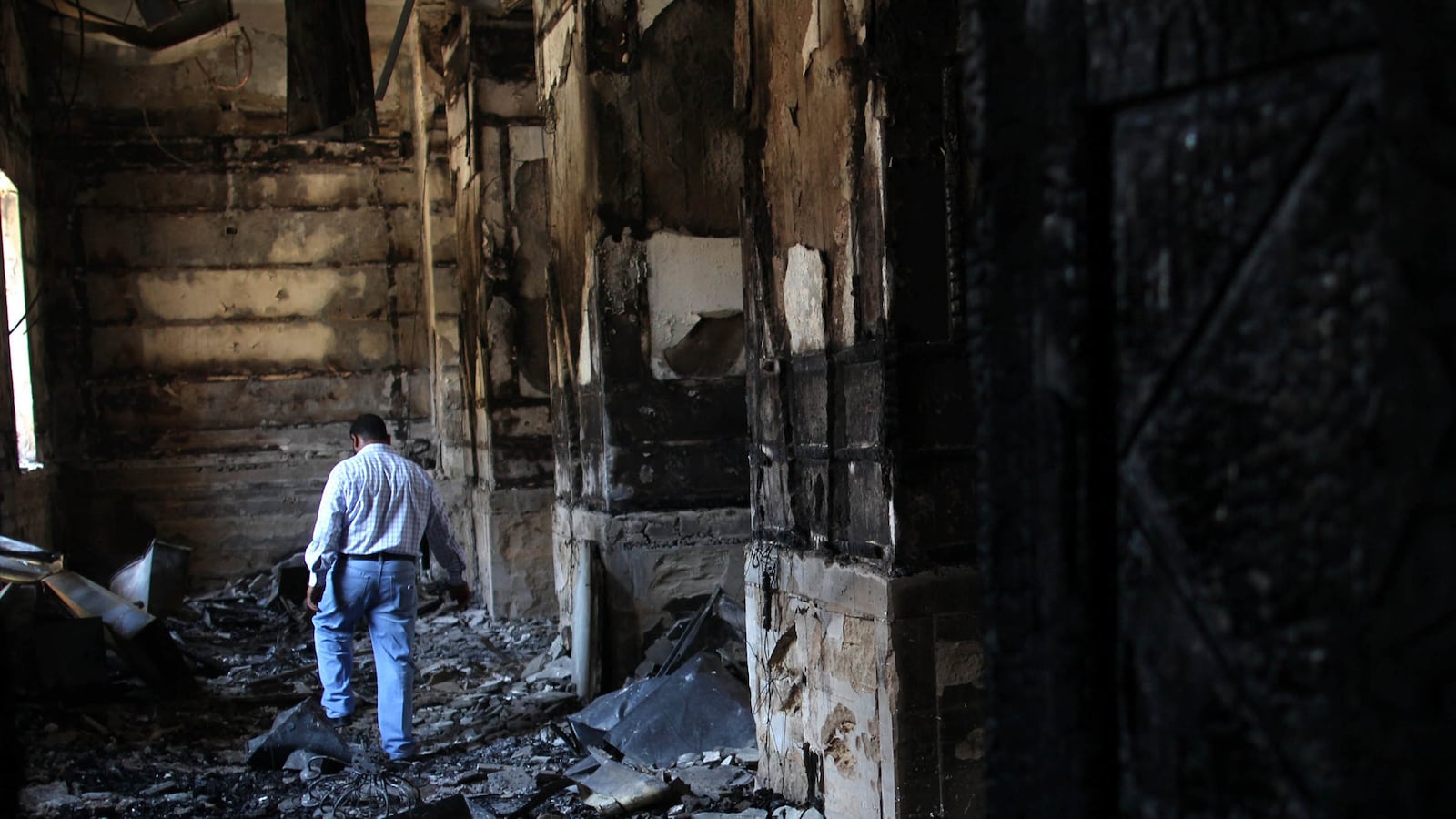The marches on the church of the Virgin Mary in Hakim, a poor village outside Cairo, began after Egypt's Islamist president, Mohamed Morsi, was ousted last month. The mob that amassed in the village street chanted: “’Down, down with the Church. Shame on the Church for acting as revolutionaries!’” according to Father Boktor Saad, the priest at Virgin Mary.
On Wednesday, Saad watched from the window of his nearby house as a crowd of some 200 people scuffled near the church's entrance with local Muslims who tried to keep the mob from breaking through the front door. The Christians in the village, including Saad, were too afraid to get involved, he says. "If I came out, that would be their chance, maybe, to hurt me," he said.

According to Saad and other witnesses, the horde finally broke through the windows, looting any valuables before setting the building on fire. The following morning, Saad stood at the entrance to the church overlooking the mass of charred debris that volunteers, their hands covered with ash, had piled into the street. The horde “took any Christian religious symbols, burned them, and threw them out the windows," said Amir William, a congregant, who watched from a roof nearby.
During these volatile and violent days in Egypt, Coptic Christians have found themselves increasingly under threat. Some Morsi supporters blame the Christians for their downfall because Christians backed the army and participated in the mass protests that sparked Morsi’s overthrow. The attack on the church in Hakim was one of several that reportedly took place following the army’s brutal crackdown on Islamist protesters Wednesday.
The exact number of attacks across the country is still unclear. But on Thursday, Egypt's interior ministry said that seven churches had been burned while a Christian activist group, the Maspero Youth Union, put the number at 17. "This is a reaction," said Saad.
On Wednesday, Egyptian security forces cleared a central square in Cairo where Morsi supporters had been staging a weeks-long protest. Ensuing violent clashes reportedly cost the lives of at least 525 people and injured 3,700 others.
In response to the bloodshed, President Barack Obama warned that Egypt was on a "dangerous path," as he criticized both the crackdowns in Cairo and the church attacks in a speech on Thursday. "The cycle of violence and escalation needs to stop," Obama said.
Obama also canceled an upcoming joint military exercise with Egypt and suggested that more changes could be in store. "While we want to sustain our relationship with Egypt, our traditional cooperation cannot continue as usual when civilians are being killed in the streets and rights are being rolled back," he said.
Officials from Morsi's Muslim Brotherhood told the Daily Beast that the group and its allies were not to blame for any church burnings or aggression. “Let me put it this way: the Muslim Brotherhood is completely against violence,” said Ahmed Aref, an official spokesman for the group. Instead, he suggested that security forces might be behind the attacks as part of a ploy to turn public opinion further against the Islamists. He conceded, though, that some hardcore Morsi supporters could have been involved. "This might be a reaction from some people who are angry, but that doesn't mean that we agree at all," he said.
Hanan Fekry, the deputy editor of Watani, a Christian newspaper based in Cairo, has worked with her reporters to try and document the attacks. Digging through a thick file on her desk, she noted several reported incidents since Morsi's ouster--the gunning down of a priest in Sinai, the burning of shops and houses, Christians attacked and killed. Much of the alleged violence has taken place outside of Cairo, particularly in conservative Upper Egypt. "I want to tell you something: since June 30, there has been a sort of public punishment,” against Christians, she said.
Following Wednesday’s clashes between the army and the Islamists, the mood among Christians has become especially tense, she said, with neighbor starting to fear neighbor. The sense of unease was palpable in Cairo as the dust cleared on Thursday.
At St. Fatima Church in Cairo's Heliopolis, graffiti spray-painted on the church's walls called for Morsi's return. Around the corner, graffiti read: "Sisi” the head of the Egyptian army, “is Israel's dog."
The church, which takes up an entire block, was completely shuttered. Glass panels in a door had been shattered by rocks during a political protest that tore through the neighborhood on Wednesday. Hearing the doorbell, a hesitant cleaner opened the door a crack to see who it was. He was noticeably afraid. "You should go to Minya," he said, referring to an area in Upper Egypt where anti-Christian violence reportedly has been especially intense. Another man inside the church said his family in Minya was currently hiding in their home, afraid for their lives. Over a dozen churches in Minya alone have been attacked or torched since the violent dispersal of the Islamist sit-ins, they said.
“This is an attempt by the Muslim Brotherhood to take revenge,” said Amir Beshay, a Christian who has helped compile a comprehensive list of recent attacks on Copts. Beshay says that Christians have long been used as scapegoats by the Muslim Brotherhood. In Upper Egypt these days, young Christian girls now sometimes wear the scarves known as hijab over their hair to disguise themselves in public. But, he warned: "It is not Christians against Muslims. It's Christians and Muslims against extremists who are taking down the country."
Dr. Ramez Atallah, the general director of the Bible Society of Egypt, agreed. For 129 years, the society -- the main distributor of Bibles in the country--had never come under attack. But on Wednesday, two of its 15 stores were burned down, according to Atallah who believes the attacks were meant to sow discord. "The Muslim Brotherhood doesn’t just want to attack Christians,” he said. “They want to create instability in the country.”
With reporting by Maged Ated in Cairo







